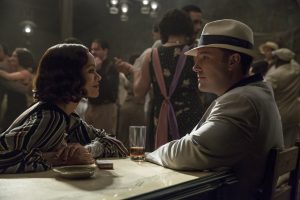Live By Night
Posted on January 12, 2017 at 5:45 pm

Unfortunately, this time Ben Affleck the director picked Ben Affleck the screenwriter and Ben Affleck the actor for this crime drama set in post WWI, prohibition-era Boston and Florida. Affleck the director has a good eye for detail. He understands the pacing of individual scenes, selects a great cast (other than himself), cinematographer (Robert Richardson), and composer (Harry Gregson-Williams) and has a good sense for visual storytelling. But in this case he was let down by Affleck the screenwriter, who allows the storyline to become so episodic it loses energy. And Affleck the actor gives the weakest performance in the film. He wants to be strong and stoic but comes across as blank and unfocused. It is disappointing to see Warner Brothers, the studio behind gangster classics, produce a film that has nothing of their grit or vitality.
Affleck plays Joe Coughlin, son of an Irish-American cop (Brendan Gleeson) who returns from fighting in WWI determined not to answer to anyone again. He wants to make his own rules. So he becomes involved in crime. Even criminals have rules, and Joe breaks those, too, having a passionate affair with Emma (Sienna Miller), who is supposed to be the girlfriend of the boss of the Irish mob. She betrays him (revealed early in the film, unlike the book), and is reported killed in a chase that ends with her car going into the water. He is badly beaten and then sent to prison.
When he gets out, he goes to Tampa, where he and his friend Dion Bartolo (Chris Messina) muscle their way into the crime scene there. Joe becomes involved with Graciela (Zoe Saldana) and she encourages him to take over the rum distribution. Immediately after telling him she will not sleep with him, she sleeps with him, discomfiting even in a retro story. More thuggery. More killing.
A local cop named Figgis (Chris Cooper) explains that he associates with crooks but is not one himself. His compartmentalization is geographic as well as moral, and he outlines for Joe with a map where he can operate. Later, when Joe needs leverage, he shows Figgis photos of his adored daughter Loretta (willowy Elle Fanning), hooked on drugs and prostituting herself. Joe will tell Figgis where she is in exchange for redrawing those moral boundaries. We later see Figgis punishing her by whipping her bare behind. And she becomes an Aimee Semple McPherson-style evangelist, showing the needle scars on her arms to the crowd as proof of her redemption, and calling on her followers to stay away from the demon rum that Joe is selling.
Joe’s run-ins with cruder thugs, including the KKK, are intended to show that he, too compartmentalizes and perhaps to raise the question of how each of us draws lines, and then redraws them, as we make choices about how far we will go. The excellence in production design and cinematography only show by contrast the superficiality of the story which like the other recent period film from an actor-turned-director, Warren Beatty’s “Rules Don’t Apply,” puts form above substance, or, worse, thinks they are the same thing.
Parents should know that this is a gangster film with extensive violence, including many graphic and disturbing images and characters who are injured and killed. The film also has strong language including racist epithets and sexual references and situations.
Family discussion: Why did Joe want to talk to Emma? How was Joe different from some of the other gangsters? How did his experience in the army influence him?
If you like this, try: “The Godfather,” parts 1 and 2
